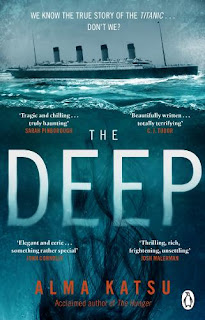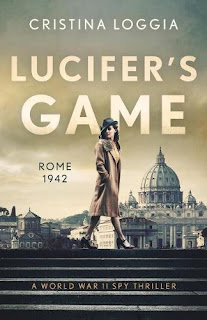Meet Alma Katsu Author Of The Deep
American author Alma Katsu used her intelligence agency background to juggle hundreds of facts when writing her historical horror thriller The Deep, inspired by the true story of the sinking of the Titanic. She tells us why she went against her MA teachers' advice to avoid plotting, the lure of beautiful notebooks and spills the beans on her next novel, Red Widow.
Download the ebook of The Deep from Amazon or buy the paperback from Thriller Women's list at Bookshop.org. NB: if you buy books through this link we may earn a commission from bookshop.org, whose fees support independent bookshops.
TW: Alma, we thoroughly enjoyed reading The Deep. What first drew you to writing about the sinking of both the Titanic and its sister ship the Britannic?
AK: After The Hunger I was faced with a bit of a dilemma. Readers were asking what great disaster I would use for my next book. It’s harder than you might think to find an epic disaster that can hold the weight of a good story. One day I walked into the living room as my husband was watching a documentary on the Britannic. I didn’t even know there had been a sister ship to the Titanic, let alone that it had sunk, too, so I joined him. When the narrator said there was a woman who had survived both sinkings, I knew there had to be a story there.
TW: In the book, you effortlessly blend fact with fiction, adding supernatural elements, as you did with your previous novel The Hunger. What appeals to you about this technique, and can you tell us how much research you carried out about the history of both ships? Did you research everything before you started writing?
AK: I’m probably good at it because of my experience as an intelligence analyst. It makes you good at compiling and sorting through facts. I’m a super quick researcher and good at organization. Juggling a ton of facts doesn’t faze me, and there were thousands of facts associated with the Titanic - there were 2300 passengers and crew alone!
For these books, I generally do in-depth research only on the parts that I know are important to the story that I don’t know well already. In the case of the Titanic, it was the ship’s layout. I also read up on the passengers and crew to decide which real-life people would be in the book. The rest - spot research - I do along the way so as not to slow down getting to the writing stage.
The supernatural part comes from my love of speculative fiction and fairytales, from my youth. We all need a little magic in our lives. It’s what makes it possible to live with the unbearable.
TW: You bring several real-life characters into The Deep, particularly those who were on board the Titanic. Did you worry about getting their various portrayals absolutely right? Can too much research stifle your creativity?
AK: The question of how much license a writer can take in portraying a real person is something every writer of historical fiction struggles with. My books are billed as reimaginings, so I hope readers don’t expect them to be true to life. Generally, I do my research on a person and try to imagine how they might behave given the circumstances, but then there’s the demands of the story to consider, too.
Generally, readers haven’t seemed too bothered by deviations. Most are looking for a good story and don’t know a lot about the event going into the book. I hear a lot that readers are so intrigued after reading my novels that they read everything they can get their hands on to see what was fact and what was fiction, and that’s the highest praise you can get as a historical fiction writer I think.
TW: Both The Deep and The Hunger deal with dark subject matter. Is that something you’ve always been drawn to as a writer, or did the interest take you by surprise?
AK: Yes, absolutely. I am not an optimistic, cheery person by nature. I started reading dark speculative fiction by the time I was eight or nine. Not a Disney princess kind of gal.
TW: Writing two different narrative timelines and from different points of view, as you have done in The Deep, can be challenging for even the most experienced of writers. How much of the plot had you planned out in advance, when you already knew the end point(s)? Are you a plotter or a pantser?
AK: Those historical horror novels are a bear to write. I use multiple timelines and spreadsheets for tracking things. After producing a number of books like these, you get used to all the juggling. For The Deep and The Hunger the plot had to be completely planned out in advance so you knew what things had to overlap and in what order. It requires some project management skills, let me tell you.
In the MA in writing programme I went through, plotting (and commercial fiction in general) was frowned upon. The story was supposed to be organic to the characters: you imagined the characters so fully that when faced with a specific dilemma, their actions were inevitable. It took a while to overcome a distaste for plotting in advance, but there’s really no other way with today’s thrillers. Readers demand a high degree of trickiness in their stories!
TW: Reading about your new book Red Widow, this seems like a change of direction for you. Can you tell us more about it?
AK: In Red Widow a young CIA officer is asked to track down the mole inside Russia Division who’s giving up important assets - Russians that CIA has recruited to spy for them - to Moscow. Once a rising star, her job is now hanging by a thread and this is an opportunity to redeem herself. But once she starts pulling the threads, she finds a web of intrigue that lead to a tragic incident in the Division’s recent past and secrets she wasn’t meant to uncover.
Red Widow is about trust and loyalty and betrayal. It’s about the imbalance of power between the very powerful agencies that conduct our nation’s intelligence and the people who work there. As I mentioned above, I worked in intelligence and know the field well. Because it’s the business of keeping secrets there’s the potential for abuse. Working at CIA you can’t know all of its secrets. That’s a given. You have to trust that the Agency will act in your best interest. When you find out that you’ve been sacrificed - your life, your future - your trust is shattered.
TW: When do you write? Do you have a routine and what are your writerly bad habits?
AK: I try not to be too precious about writing habits, meaning I think you should be able to write anytime and anywhere, but lately I seem to do my best writing first thing in the morning: a throwback to my defence department days, probably, where getting in early was the norm and you had the terrible DC beltway traffic to contend with.
I don’t know if it’s a bad habit but I try not to use paper, not for notetaking or writing drafts. Trying to leave a smaller footprint, I guess, plus it’s less shedding or getting rid of mess once the book is done and you’re packing things away. I keep a few notebooks around for working out plot problems because that just seems the best way for me to put ink to paper. Plus it’s nice to have a few beautiful notebooks lying around.
TW: What books do you read for pleasure and what are your favourite novels?
AK: I’m afraid I’m going to be a bit of a spoilsport, but I have to say that I rarely read for pleasure. You need to keep up on your field, follow your peers, read the latest 'hot' novels. That doesn’t leave a lot of time for pleasure. I’m an old workhorse, a holdover from my days as an analyst.
That said, I like historical fiction, which might seem funny for someone who is a technology futurist. You’d think I’d like science fiction, but not particularly.
TW: What is the most important piece of writing advice you’ve ever been given?
AK: I saw a panel once where Janet Evanovich said “don’t save anything for the next book”, meaning to go for broke when you’re writing and worry about the next book when you get to it. It’s the perfect advice for writing thrillers. Readers expect a lot from their books these days!
Quick fire questions:
TW: A book you would take on a long journey?
AK: Whatever book, it’s bound to be an audiobook! I always listen to audiobooks on long car trips. Most recently I listened to Providence by Caroline Kepnes and Behind Her Eyes by Sarah Pinborough.
TW: Your favourite historical novel?
AK: The Dress Lodger by Sheri Holman
TW: An author whose work you admire?
AK: Denise Mina and Laura Lippman, two superb mystery writers.
TW: Something to drink whilst you are writing?
AK: Usually tea gone cold.
TW: Your favourite place to read?
TW: Your favourite place to read?
TW: In bed.
Thanks Alma!
More about The Deep:
Deaths and disappearances have plagued the vast liner from the moment she began her maiden voyage on 10 April 1912. Four days later, caught in what feels like an eerie, unsettling twilight zone, some passengers - including millionaire Madeleine Astor and maid Annie Hebbley - are convinced that something sinister is afoot. And then disaster strikes.
Four years later and the world is at war. Having survived that fateful night, Annie is now a nurse on board the Titanic's sister ship, the Britannic,refitted as a hospital ship. And she is about to realise that those demons from her past and the terrors of that doomed voyage have not finished with her yet . . .
Bringing together Faustian pacts, the occult, tales of sirens and selkies, guilt and revenge, desire and destiny, The Deep offers a thrilling, tantalizing twist on one of the world's most famous tragedies.
***
We have lots of interviews with great writers coming soon on the blog making a it a perfect place to get for spring/summer reading ideas. So you don't miss any of them subscribe to receive a weekly update by clicking on the button at the top of the page and adding your email address.
Four years later and the world is at war. Having survived that fateful night, Annie is now a nurse on board the Titanic's sister ship, the Britannic,refitted as a hospital ship. And she is about to realise that those demons from her past and the terrors of that doomed voyage have not finished with her yet . . .
Bringing together Faustian pacts, the occult, tales of sirens and selkies, guilt and revenge, desire and destiny, The Deep offers a thrilling, tantalizing twist on one of the world's most famous tragedies.
***
We have lots of interviews with great writers coming soon on the blog making a it a perfect place to get for spring/summer reading ideas. So you don't miss any of them subscribe to receive a weekly update by clicking on the button at the top of the page and adding your email address.




Comments
Post a Comment